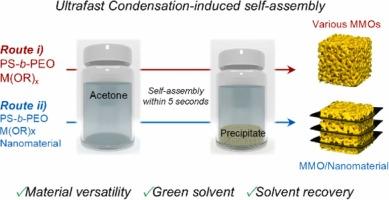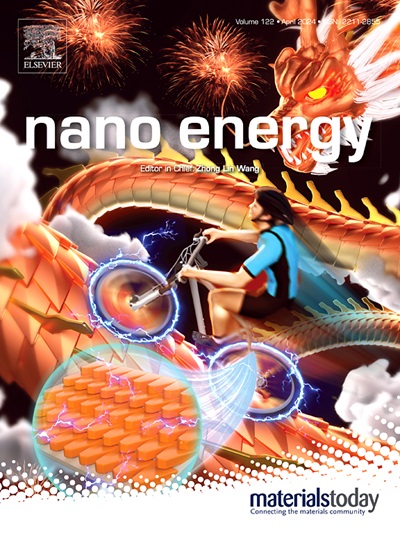通过超快凝聚诱导自组装将一维/二维纳米材料均匀集成到介孔金属氧化物中,以增强锂离子的存储能力
IF 17.1
1区 材料科学
Q1 CHEMISTRY, PHYSICAL
引用次数: 0
摘要
将纳米材料均匀集成到介孔金属氧化物(MMOs)中仍然是一个长期存在的挑战,因为传统的溶剂蒸发驱动嵌段共聚物自组装往往导致相偏析和结构不均匀,从而阻碍了MMOs与纳米材料之间协同效应的实现。本文介绍了一种超快凝聚诱导自组装(CISA)策略,该策略利用嵌段共聚物溶液中金属醇氧化物的快速凝聚在几秒钟内触发自组装。这种快速的溶液阶段工艺可以将1D/2D纳米材料均匀地结合到介观结构的mmo中。由此产生的纳米复合材料比其MMO同类材料具有更高的锂离子电池性能。此外,由于CISA工艺避免了溶剂蒸发,采用了绿色溶剂(丙酮),通过简单的净化步骤即可完全回收溶剂,提高了环境的可持续性。此外,通过引入凝聚而不是蒸发作为嵌段共聚物自组装的新驱动力,CISA为MMOs及其纳米复合材料的绿色合成提供了一个多功能平台,在储能,催化和传感方面具有广泛的应用。本文章由计算机程序翻译,如有差异,请以英文原文为准。

Homogeneous integration of 1D/2D nanomaterials into mesoporous metal oxides via ultrafast condensation-induced self-assembly toward enhanced lithium-ion storage
Homogeneous integration of nanomaterials into mesoporous metal oxides (MMOs) remains a long-standing challenge, as conventional solvent evaporation–driven block copolymer self-assembly often leads to phase segregation and structural inhomogeneity, thereby hindering the realization of synergistic effects between MMOs and nanomaterials. Herein, we introduce an ultrafast condensation-induced self-assembly (CISA) strategy that leverages the rapid condensation of metal alkoxides in block copolymer solutions to trigger self-assembly within seconds. This rapid solution-phase process enables the uniform incorporation of 1D/2D nanomaterials into mesostructured MMOs. The resulting nanocomposites exhibit enhanced lithium-ion battery performance over their MMO counterparts. Furthermore, as CISA process avoids solvent evaporation and employs a green solvent (acetone), it allows complete solvent recovery through a simple purification step, enhancing the environmental sustainability. In addition, by introducing condensation instead of evaporation as a new driving force for block copolymer self-assembly, CISA offers a versatile platform for the green synthesis of MMOs and their nanocomposites with broad applications in energy storage, catalysis, and sensing.
求助全文
通过发布文献求助,成功后即可免费获取论文全文。
去求助
来源期刊

Nano Energy
CHEMISTRY, PHYSICAL-NANOSCIENCE & NANOTECHNOLOGY
CiteScore
30.30
自引率
7.40%
发文量
1207
审稿时长
23 days
期刊介绍:
Nano Energy is a multidisciplinary, rapid-publication forum of original peer-reviewed contributions on the science and engineering of nanomaterials and nanodevices used in all forms of energy harvesting, conversion, storage, utilization and policy. Through its mixture of articles, reviews, communications, research news, and information on key developments, Nano Energy provides a comprehensive coverage of this exciting and dynamic field which joins nanoscience and nanotechnology with energy science. The journal is relevant to all those who are interested in nanomaterials solutions to the energy problem.
Nano Energy publishes original experimental and theoretical research on all aspects of energy-related research which utilizes nanomaterials and nanotechnology. Manuscripts of four types are considered: review articles which inform readers of the latest research and advances in energy science; rapid communications which feature exciting research breakthroughs in the field; full-length articles which report comprehensive research developments; and news and opinions which comment on topical issues or express views on the developments in related fields.
 求助内容:
求助内容: 应助结果提醒方式:
应助结果提醒方式:


